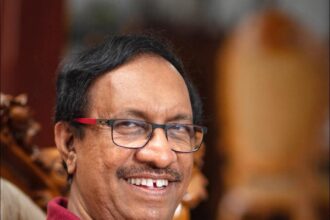Sri Lankan PhD student Ajmal Abdul Azees has been recognized as a finalist in the Research Category of the 2024 Victorian International Education Awards.
The Australian High Commission in Sri Lanka said his work on hybrid cochlear implants is supporting advancements in hearing technology.
In a congratulatory message, the High Commission added that this was another example of the positive impact of Australia – Sri Lanka educational ties.
Commenting on his award, PhD candidate Ajmal Abdul Azees, who developed the world’s first hybrid cochlear implant said “It’s really good recognition. I had tears in my eyes.”
“So far, I have worked three and a half years on my PhD and it’s like paying off what you have done with some recognition, which tells you that you have done something.”
Azees, who travelled from Sri Lanka to study at RMIT and is also a researcher at the Bionics Institute, has overhauled the cochlear implant, which has remained unchanged since 1978.
A cochlear implant is a small, complex electronic device that can help to provide a sense of sound to a person who is deaf or severely hard of hearing.
Pre-clinical trials are currently underway at St Vincent’s Hospital.
“[The cochlear implant] helps people to hear again, but it uses electricity. So my project was involved in different technology using light to stimulate the auditory nerve to help people to hear again,” he said.
“Globally around 700 million people are deaf. [The recognition] will raise awareness of what I’m trying to do and help with my future research. So that’s a good feeling.”
Saskia Loer Hansen, Deputy Vice-Chancellor International and Engagement, said the awards provide great recognition for students and highlight the valuable contribution they make to the Victorian community. (Newswire/ RMIT Australia)
The post Sri Lankan PhD student finalist for groundbreaking cochlear implant research appeared first on Newswire.




